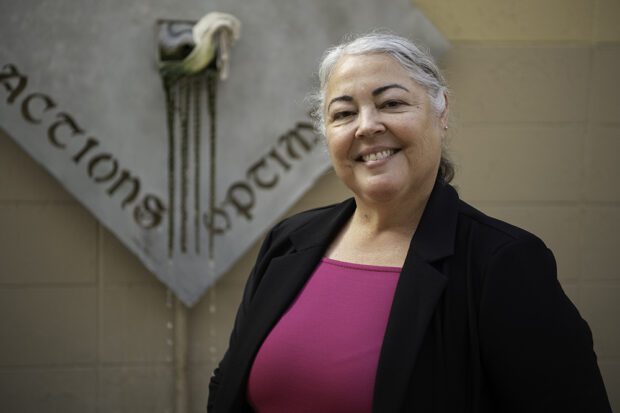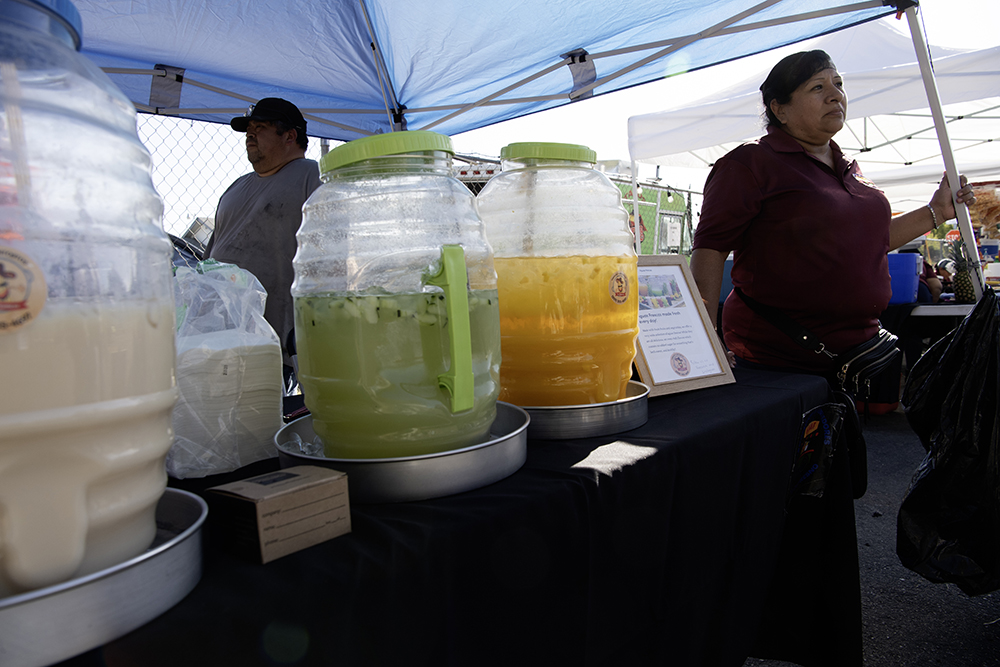
Street vendors are already part of the landscape of the Valley’s cities and towns. Their presence is most noticeable during public events, from sporting and cultural events to political protests. The style of the carts they push under the blazing sun or rain depends on the product they offer; the elotero (corn) cart is not the same as that of a fresh fruit or hot dog cart.
The food they offer is more than just nostalgia—think of corn covered in cheese and chili (and sometimes mayonnaise too), or refreshing raspados (scraped fruit). During the Valley summer, it’s no surprise that we crave a paleta (popsicle).
And while we enjoy the products they offer, we rarely consider that street vendors are workers who spend long hours roaming streets and parks looking for customers and who have families to feed. We also don’t think about where they produce or cook what they sell. And this very aspect is crucial to their survival, as they don’t always comply with sanitary requirements and municipal permits. This often leads to fines.
“The law requires that the food sold by street vendors be prepared following strict sanitary rules; this food could be prepared in a community kitchen certified by health authorities,” says Genoveva Islas, director of the Fresno-based organization Cultiva la Salud, which is leading a community kitchen project to benefit street vendors that lack the capacity to cook according to strict sanitary controls. The City of Fresno has donated $700,000 to Cultiva la Salud for its community kitchen project.

The quality of the food consumed by low-income groups is questionable and affects people’s health and well-being.
“We promote the well-being of society, the health of the community,” says Islas. “To achieve this, people need to eat well and be active.
“In low-income communities and neighborhoods, there are more junk food restaurants, more alcohol stores, and fewer stores that sell fresher, healthier food or products.
“A few years ago, Los Angeles state university (UCLA) conducted a study in the Fresno area and found that the local population has five times more access to junk food than to healthy foods.”
In Fresno, the businesses that sell or prepare healthier foods are located in the north of the city, an area inhabited by higher-income people than in the south.
Consuming cheaper but less healthy products is a common practice in low-income areas, where options are much more limited. People form habits, and these affect health and lead to more diseases.
“We decided to do something,” noted Islas. “We started working with some Hmong farmers and the National Hmong American Farmers Association to establish five fresh produce stands at a school in southeast Fresno, and this was well received by the people.
“It’s not that they don’t want to eat healthy; the problem is access. The problem is that selling junk food—chips, soda, etc.—doesn’t require any permit, while selling healthy food does. That’s why we need a community kitchen, so that vendors can cook according to the authorities’ requirements and so that it can be a place where they can train and take courses.”
Cultiva la Salud already has a building for the future community kitchen: an old laundromat located in downtown Fresno. Cultiva la Salud’s offices will be upstairs, and they are now remodeling the building.
“The budget is $3 million; we’ve already raised $2 million,” Islas says enthusiastically. “We have to consider who will be using it; each person might cook different foods. We think about 50 vendors could use the kitchen. And we also have to think about logistics, which won’t be easy. The kitchen will also be a training ground.”
Islas’dream of creating a community kitchen is getting closer to becoming a reality.
The Cost of Complying with the Law
The Street Vendors Association is an independent organization founded three years ago in Fresno. Its leader is Miguel López, and it has approximately 40 members. In recent months, the association has been negotiating with the City and County of Fresno to get more vendors to obtain permits in order to sell. This means that the carts used by vendors must be approved.
Starting July 1, authorities will require those permits. Those who don’t have one will have to pay a fine.
“A corn cart costs between $8,000 and $9,000, depending on the material used,” said López. “I don’t think all vendors will be able to have their carts by July 1; it seems they are behind on deliveries.”
López estimates that due to the high cost of the cart and the delay in delivery, many eloteros (vendors selling “elotes,” or corn) will decide not to sell corn on the cob. Other products, such as fresh fruit, only require a City permit.
“Carts are a little expensive, but I see it as a business. And besides, we won’t be bothered by the authorities anymore; we’ll be able to move around and sell more freely,” says López.
“I’ve been a street vendor for 16 years, and until now, there’s never been any control or order…So people from other towns come to sell because they see that in Fresno, they don’t ask for anything. As an association, we want everyone to have a permit to sell, no matter where they come from.”
Street vendors face serious risks in their work, Lopez explains, from people not paying them for their products to harassment and physical violence. In Fresno, in 2023, 45-year-old vendor Lorenzo Pérez was murdered during a robbery. This crime generated pressure from the community for the City to better protect street workers. Negotiations for vendors to obtain permits and support for the community kitchen project are part of Fresno’s response.
López believes this process benefits everyone. “We have the right to sell, but we also have obligations.”

